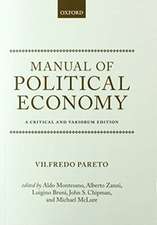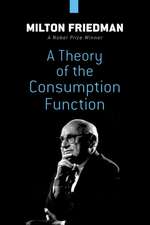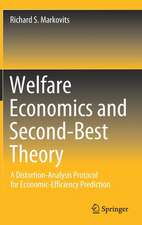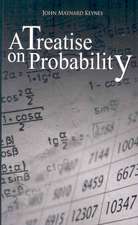The General Theory of Employment, Interest, and Money
Autor John Maynard Keynesen Limba Engleză Paperback – 31 oct 2016
| Toate formatele și edițiile | Preț | Express |
|---|---|---|
| Paperback (6) | 58.32 lei 43-57 zile | |
| CreateSpace Independent Publishing Platform – | 99.24 lei 22-36 zile | |
| Prometheus Books – 30 apr 1997 | 103.99 lei 22-36 zile | +20.55 lei 5-11 zile |
| www.bnpublishing.com – 17 iul 2008 | 114.61 lei 22-36 zile | |
| stanfordpub.com – 31 oct 2016 | 149.10 lei 22-36 zile | |
| Springer International Publishing – 31 iul 2018 | 256.53 lei 22-36 zile | +28.56 lei 5-11 zile |
| Must Have Books – 28 feb 2021 | 58.32 lei 43-57 zile |
Preț: 149.10 lei
Nou
Puncte Express: 224
Preț estimativ în valută:
28.54€ • 29.41$ • 24.09£
28.54€ • 29.41$ • 24.09£
Carte disponibilă
Livrare economică 10-24 februarie
Preluare comenzi: 021 569.72.76
Specificații
ISBN-13: 9781684111435
ISBN-10: 1684111439
Pagini: 416
Dimensiuni: 152 x 229 x 25 mm
Greutate: 0.67 kg
Editura: stanfordpub.com
ISBN-10: 1684111439
Pagini: 416
Dimensiuni: 152 x 229 x 25 mm
Greutate: 0.67 kg
Editura: stanfordpub.com
Notă biografică
John Maynard Keynes (1883-1946) is one of the most influential economists of modern times. Educated at Cambridge University, he returned to teach at, and become a fellow of, Kings College, Cambridge. In 1915 Keynes joined the UK Treasury and acted as an advisor to government for many years. His ideas are now known the world over as Keynesian economics.
Descriere
Descriere de la o altă ediție sau format:
In 1936 Keynes published the most provocative book written by any economist of his generation. Arguments about the book continued until his death in 1946 and still continue today. This new edition, published 70 years after the original, features a new introduction by Paul Krugman which discusses the significance and continued relevance of "The General Theory,"
In 1936 Keynes published the most provocative book written by any economist of his generation. Arguments about the book continued until his death in 1946 and still continue today. This new edition, published 70 years after the original, features a new introduction by Paul Krugman which discusses the significance and continued relevance of "The General Theory,"
Recenzii
'"The General Theory" is nothing less than an epic journey out of intellectual darkness. That, as much as its continuing relevance to economic policy, is what makes it a book for the ages. Read it, and marvel.' - From the introduction by Paul Krugman
Cuprins
Preface by John Maynard Keynes.- Preface to the German Edition. -Preface to the Japanese Edition. -Preface to the French Edition.- Introduction by Paul Krugman.- Book I Introduction.- 1 The General Theory.- 2 The Postulates of the Classical Eco.- 3 The Principle of Effective Demand.- Book II Definitions and Ideas.- 4 The Choice of Units. - 5 Expectation as Determining Output and Employment.- 6 The Definition of Income, Saving and Investment.- 7 The Meaning of Saving and Investment Further Considered.- Book III The Propensity to Consume.- 8 The Propensity to Consume: I. The Objective Factors.- 9 The Propensity to Consume: II. The Subjective Factors.- 10 The Marginal Propensity to Consume and the Multiplier.- Book IV The Inducement to Invest.- 11 The Marginal Efficiency of Capital.- 12 The State of Long-Term Expectation.- 13 The General Theory of the Rate of Interest.- 14 The Classical Theory of the Rate of Interest.- 15 The Psychological and Business Incentives to Liquidity.- 16 Sundry Observations on the Nature of Capital.- 17 The Essential Properties of Interest and Money.- 18 The General Theory of Employment Re-Stated.- Book V Money-wages and Prices.- 19 Changes in Money-wages.- 20 The Employment Function.- 21 The Theory of Prices.- Book VI Short Notes Suggested by the General Theory.- 22 Notes on the Trade Cycle.- 23 Notes on Mercantilism, The Usury Laws, Stamped Money and Theories Of Under-Consumption.- 24 Concluding Notes on the Social Philosophy Towards which the General Theory Might Lead.- Afterword by Robert Skidelsky.
Textul de pe ultima copertă
This book was originally published by Macmillan in 1936. It was voted the top Academic Book that Shaped Modern Britain by Academic Book Week (UK) in 2017, and in 2011 was placed on Time Magazine's top 100 non-fiction books written in English since 1923. Reissued with a fresh Introduction by the Nobel-prize winner Paul Krugman and a new Afterword by Keynes’ biographer Robert Skidelsky, this important work is made available to a new generation.
The General Theory of Employment, Interest and Money transformed economics and changed the face of modern macroeconomics. Keynes’ argument is based on the idea that the level of employment is not determined by the price of labour, but by the spending of money. It gave way to an entirely new approach where employment, inflation and the market economy are concerned.
Highly provocative at its time of publication, this book and Keynes’ theories continue to remain the subject of much support and praise, criticism and debate. Economists at any stage in their career will enjoy revisiting this treatise and observing the relevance of Keynes’ work in today’s contemporary climate.
The General Theory of Employment, Interest and Money transformed economics and changed the face of modern macroeconomics. Keynes’ argument is based on the idea that the level of employment is not determined by the price of labour, but by the spending of money. It gave way to an entirely new approach where employment, inflation and the market economy are concerned.
Highly provocative at its time of publication, this book and Keynes’ theories continue to remain the subject of much support and praise, criticism and debate. Economists at any stage in their career will enjoy revisiting this treatise and observing the relevance of Keynes’ work in today’s contemporary climate.
Caracteristici
Seminal text in the field Explores the relevance of Keynes' theory 80 years since initial publication Paul Krugman's Foreword and Robert Skidelsky's Afterword re-evaluate Keynes' revolution in economic thought and bring this text to a new generation of students






















